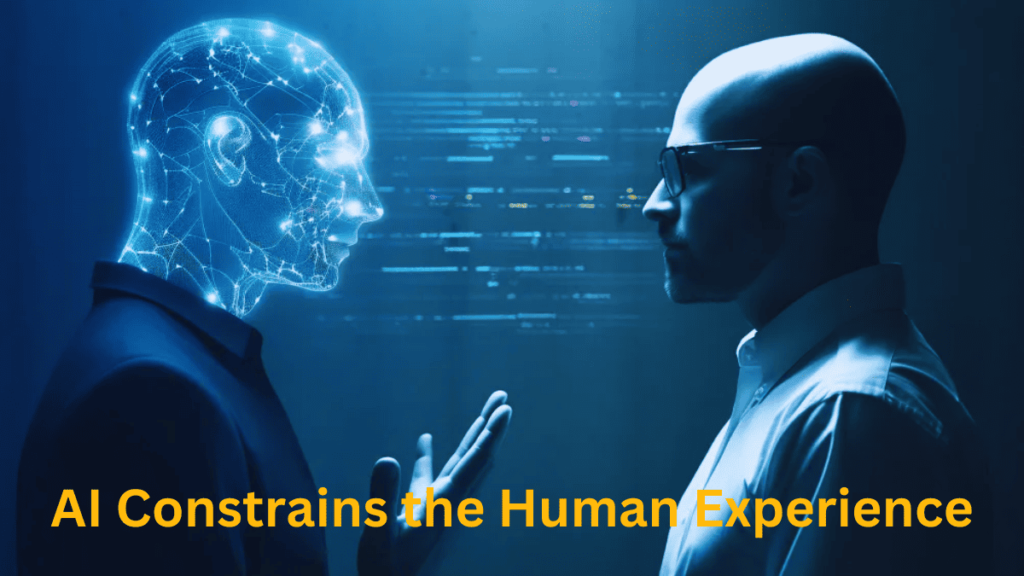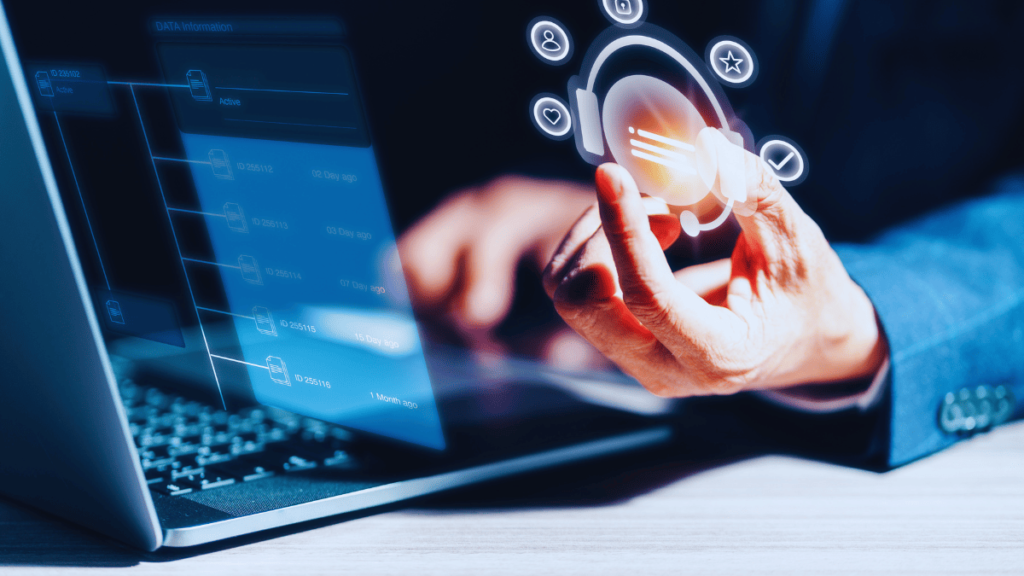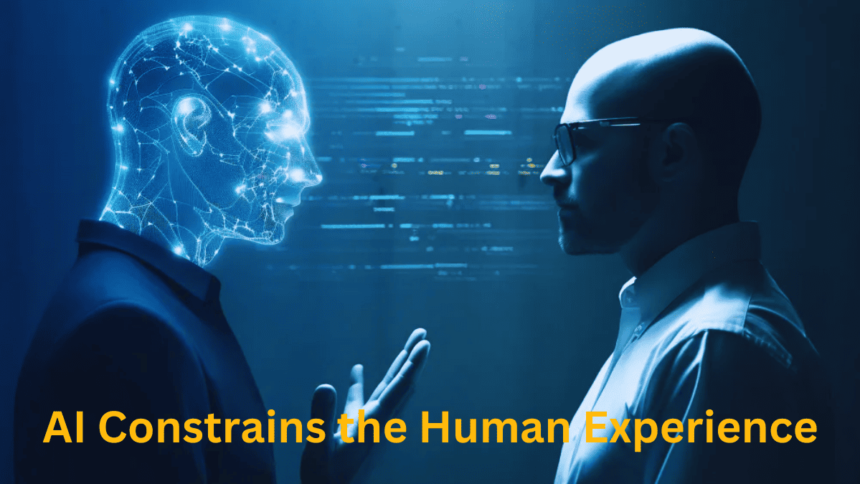Artificial intelligence (AI) has revolutionized many aspects of our lives, making processes faster, smarter, and more efficient. From personalized shopping recommendations to advanced medical diagnostics, AI seems to offer solutions to almost every problem. However, as it continues to evolve, it’s important to recognize how artificial intelligence constrains the human experience.

In this article, we’ll explore how AI, while beneficial, imposes significant limitations on human creativity, autonomy, social interactions, and privacy, showing clearly how artificial intelligence constrains the human experience in unexpected and subtle ways.
The Promise of Artificial Intelligence
There’s no denying the potential of artificial intelligence to reshape industries and simplify daily tasks. Whether automating routine jobs or providing data-driven insights in real-time, AI has opened doors to a future once unimaginable.
But behind the shiny promises lies a more nuanced reality—AI isn’t just making life easier but subtly restricting certain aspects of what makes us human. The more we rely on machines, the more we face the challenge of understanding how artificial intelligence constrains the human experience in ways we might not immediately notice.
Creativity and Innovation Are Taking a Hit
One of the most profound impacts of AI is in the realm of creativity and innovation. Human creativity is boundless, driven by curiosity, emotion, and experience. But when AI algorithms dictate what content we see or suggest, our exposure to ideas narrows. For example, social media platforms often use algorithms to push content that aligns with our existing preferences.
This limits our ability to explore new perspectives, stifling innovation and original thinking.

Moreover, AI-generated art, music, and writing have raised the question of whether machines can truly replicate human creativity. While AI can mimic styles and generate technically impressive work, it often lacks the emotional depth or unpredictability that characterizes human artistry. As AI continues to take on creative roles,
we must ask ourselves how artificial intelligence constrains the human experience by limiting the spontaneity and emotional richness of creative expression.
Erosion of Human Autonomy
Another subtle but serious consequence of AI is its impact on personal autonomy. Every day, algorithms influence our choices in ways we may not even realize. From the music we listen to to the movies we watch, to the products we buy, AI-driven recommendations guide our decisions based on past behavior. While this can be convenient, it also means our decisions are increasingly shaped by machines rather than our own free will.
This erosion of autonomy is especially evident in digital spaces, where algorithms filter the content we consume, potentially reinforcing existing biases. The more we allow AI to filter our world, the less control we have over what we experience.
This raises important questions about how artificial intelligence constrains the human experience by reducing the scope of independent thought and decision-making.
Social Interactions Are Becoming Less Human
AI is also reshaping how we interact with one another. From chatbots to virtual assistants, AI is increasingly being used to mediate human communication.
While these tools can be useful in customer service or administrative roles, they come at a cost: the loss of human touch in everyday interactions. The more we rely on AI-driven communication, the less we engage in the rich, nuanced conversations that define human relationships.

Furthermore, AI is influencing social dynamics in ways that might not be immediately apparent. For example, algorithms on dating apps are designed to match people based on data, but this data-driven approach often overlooks the complex emotional factors that contribute to human connections
. As a result, how artificial intelligence constrains the human experience can be seen in the ways it alters our ability to form deep, meaningful relationships.
Privacy in the Age of AI
Perhaps one of the most alarming ways AI impacts our lives is through its ability to collect and analyze vast amounts of personal data. From facial recognition technology to targeted ads,
AI constantly monitors our behaviors, preferences, and movements. While this may lead to more personalized experiences, it also raises significant privacy concerns.
As AI becomes more integrated into everyday life, the line between convenience and intrusion becomes increasingly blurred.
We must consider how artificial intelligence constrains the human experience by eroding our privacy and autonomy. Without proper regulation, AI could pave the way for a surveillance state where personal freedoms are continually compromised.
Conclusion
There’s no question that AI has transformed the world for the better in many respects, but it’s crucial to recognize the limitations it imposes. From stifling creativity and autonomy to affecting social interactions and privacy, the ways in which how artificial intelligence constrains the human experience are varied and complex. As we move further into an AI-driven future, we must remain vigilant in ensuring that technology serves humanity, rather than limiting the very qualities that make us human.
How does artificial intelligence constrain the human experience?
AI constrains the human experience by limiting creativity, autonomy, social interactions, and privacy. It shapes decision-making, reduces human touch in communication, and can restrict our exposure to diverse ideas.
Can AI truly replace human creativity and innovation?
While AI can generate content based on patterns and data, it lacks the emotional depth and originality that human creativity brings. AI may assist in creative processes, but it cannot fully replicate the unpredictability and emotional richness of human innovation.
What are the privacy concerns related to artificial intelligence?
AI systems often rely on vast amounts of personal data, raising concerns about surveillance and data misuse. The continuous collection of personal information by AI can compromise privacy, making it essential to address regulatory and ethical challenges.
- Can ChatGPT 3.5 Read Images? Everything You Need to Know
- OpenAI Releases Sora: A Revolutionary AI Video-Generation Tool (December 2024 Update)
- Can ChatGPT Create Documents? Exploring Its Features and Benefits for Efficient Document Creation
- OpenAI Wants to Pair Online Courses with Chatbots: A Revolution in Learning
- Using AI to Write a Book: A Human-Friendly Guide to Self-Publishing Success

